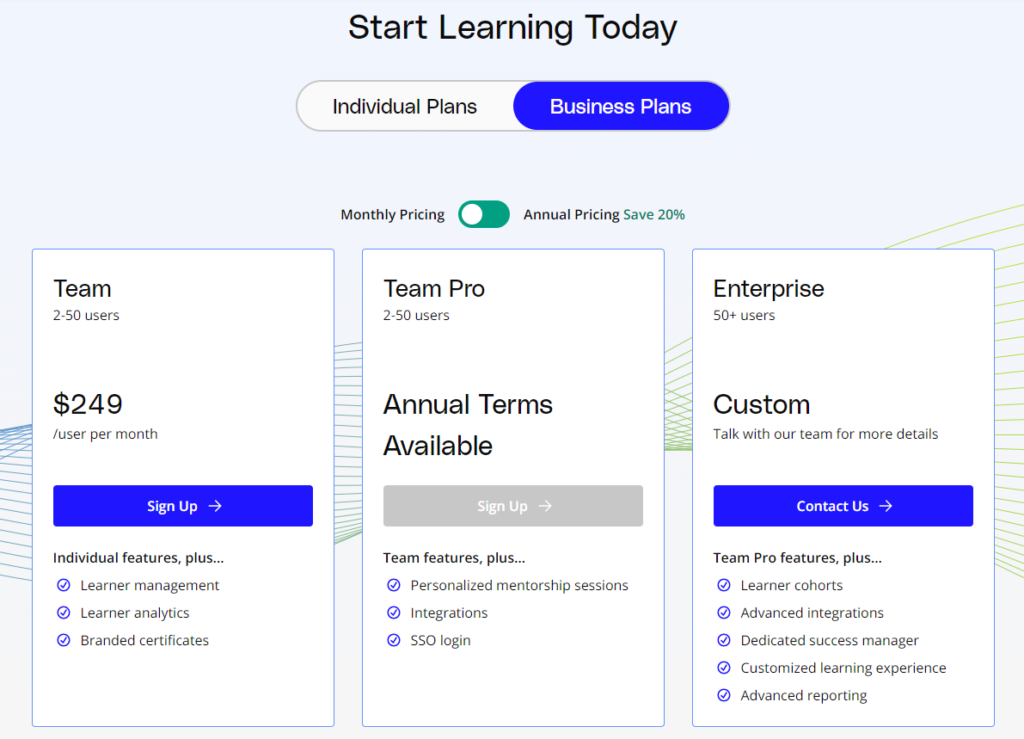What is Udacity?
Udacity is a web-based educational platform that offers online courses in a variety of fields, including computer programming, data science, and artificial intelligence. The courses are taught by experts from top universities and companies, and they typically involve hands-on projects and real-world applications. Udacity also offers Nanodegree programs, which are more intensive and career-focused than traditional courses.
Pros & Cons
Pros:
- High-quality courses: Udacity courses are taught by experienced professionals from top universities and companies. The courses are well-designed and engaging, and they provide students with a valuable learning experience.
- Hands-on projects: Udacity courses often involve hands-on projects that allow students to apply the skills they are learning to real-world problems. This helps students to develop practical skills and experience that they can use in their careers.
- Real-world applications: Udacity courses focus on topics that are relevant to the current job market. The courses teach students the skills that are in demand by employers, and they help students to develop portfolios of work that they can use to showcase their skills to potential employers.
- Career support: Udacity provides career support to its students, including resume and interview coaching, networking opportunities, and job placement assistance.
- Focus on in-demand skills: Udacity courses are designed to teach students the skills that are most in demand by employers in the technology industry.
- Flexible learning options: Udacity courses can be completed at your own pace and on your own schedule.
- Accreditation: Udacity Nanodegree programs are accredited by Southern New Hampshire University, which means that you can earn college credit for completing them.
Cons:
- Some courses can be expensive: Udacity courses can be more expensive than traditional online courses. However, the high-quality instruction and hands-on projects can be worth the investment, especially if you are serious about getting a job in the technology industry.
- Some courses can be challenging: Udacity courses are designed to be challenging and rigorous, so you will need to be prepared to put in the effort to succeed.
- The courses may not be a good fit for everyone: Udacity courses are best suited for students who are motivated and self-disciplined. If you prefer a more traditional learning environment, Udacity may not be the best option for you.
- Some courses may not be relevant to your career goals: Udacity offers a wide range of courses, so it’s important to choose courses that are relevant to your career goals.
- Some courses may not be updated regularly: Udacity is constantly adding new courses, but some of the older courses may not be updated regularly. This could mean that you’re learning outdated information.
Overall, Udacity is a great option for students who want to learn the skills they need for a career in technology. The courses are high-quality and hands-on, and the career support can be invaluable. However, Udacity courses can be expensive and challenging, so you need to be prepared to put in the effort to succeed.
Why Coursera?

There are many reasons why you might choose Udacity to learn new skills or advance your career in technology. Here are some of the key benefits of using Udacity:
- High-quality courses: Udacity courses are taught by experienced professionals from top universities and companies. The courses are well-designed and engaging, and they provide students with a valuable learning experience.
- Hands-on projects: Udacity courses often involve hands-on projects that allow students to apply the skills they are learning to real-world problems. This helps students to develop practical skills and experience that they can use in their careers.
- Real-world applications: Udacity courses focus on topics that are relevant to the current job market. The courses teach students the skills that are in demand by employers, and they help students to develop portfolios of work that they can use to showcase their skills to potential employers.
- Career support: Udacity provides career support to its students, including resume and interview coaching, networking opportunities, and job placement assistance.
- Focus on in-demand skills: Udacity courses are designed to teach students the skills that are most in demand by employers in the technology industry.
- Flexible learning options: Udacity courses can be completed at your own pace and on your own schedule.
- Accreditation: Udacity Nanodegree programs are accredited by Southern New Hampshire University, which means that you can earn college credit for completing them.
In addition to these general benefits, there are also some specific reasons why you might choose Udacity if you are interested in learning about a particular technology or industry. For example, Udacity offers a variety of courses and Nanodegree programs in the following areas:
- Computer programming: Udacity offers courses on a variety of programming languages, including Python, Java, JavaScript, and C++.
- Data science: Udacity offers courses on data analysis, machine learning, and artificial intelligence.
- Cloud computing: Udacity offers courses on Amazon Web Services (AWS), Google Cloud Platform (GCP), and Microsoft Azure.
- Mobile development: Udacity offers courses on Android development, iOS development, and Flutter development.
- Cybersecurity: Udacity offers courses on ethical hacking, penetration testing, and security engineering.
If you are interested in learning more about Udacity, I recommend visiting the Udacity website. You can also watch some of the free introductory courses on Udacity to get a taste of the platform and the quality of the instruction.
Pricing plans
Udacity offers a variety of pricing plans to meet the needs of different learners. Here are some of the options available:
- Free: Udacity offers a number of free courses that you can take to learn the basics of various topics. These courses are a great way to get started with Udacity and see if it’s a good fit for you.
- Introductory Courses: Udacity also offers a number of introductory courses that cost between $39 and $199. These courses are a great way to learn more about a specific topic before investing in a more comprehensive Nanodegree program.
- Nanodegree Programs: Udacity’s Nanodegree programs are more intensive and career-focused than traditional courses. They typically cost between $399 and $499 per month, but you can also save money by subscribing to a monthly or annual plan.
- Capstone: Udacity’s Capstone projects are designed to help you apply the skills you learn in your Nanodegree program to real-world problems. They typically cost between $99 and $199.
- Team: Udacity offers Team plans for businesses that want to provide their employees with access to Udacity’s courses and Nanodegree programs. These plans start at $2,995 per month.

FAQs
What is Udacity?
Udacity is an online learning platform that offers courses in a variety of fields, including computer programming, data science, and artificial intelligence. The courses are taught by experts from top universities and companies, and they typically involve hands-on projects and real-world applications. Udacity also offers Nanodegree programs, which are more intensive and career-focused than traditional courses.
How much does Udacity cost?
Udacity offers a variety of pricing plans to meet the needs of different learners. Here are some of the options available:
- Free: Udacity offers a number of free courses that you can take to learn the basics of various topics.
- Introductory Courses: Udacity also offers a number of introductory courses that cost between $39 and $199.
- Nanodegree Programs: Udacity’s Nanodegree programs are more intensive and career-focused than traditional courses. They typically cost between $399 and $499 per month, but you can also save money by subscribing to a monthly or annual plan.
- Capstone: Udacity’s Capstone projects are designed to help you apply the skills you learn in your Nanodegree program to real-world problems. They typically cost between $99 and $199.
- Team: Udacity offers Team plans for businesses that want to provide their employees with access to Udacity’s courses and Nanodegree programs. These plans start at $2,995 per month.
How long does it take to complete a Udacity course?
The length of a Udacity course varies depending on the subject and the instructor. Some courses can be completed in a few weeks, while others may take several months.
What are the benefits of completing a Udacity course?
Completing a Udacity course can help you learn new skills, advance your career, and earn a certificate of completion. Udacity courses are also recognized by employers and universities around the world.
Can I get a job after completing a Udacity course?
There is no guarantee that you will get a job after completing a Udacity course, but it can certainly help you stand out from the competition. Udacity courses can help you learn the skills and knowledge that employers are looking for, and they can also demonstrate your commitment to learning and professional development.
Here are some additional FAQs about Udacity:
- What is the difference between a Udacity Course and a Nanodegree program?
A Udacity Course is a single course that covers a specific topic. A Nanodegree program is a series of courses that focus on a particular career path.
- What is Udacity for Business?
Udacity for Business is a platform that allows businesses to purchase Udacity courses for their employees.
- Does Udacity offer financial aid?
Yes, Udacity offers financial aid to students who qualify.
Conclusion
Udacity is an online learning platform that offers a variety of courses in a variety of fields. The courses are taught by experts from top universities and companies, and they typically involve hands-on projects and real-world applications. Udacity also offers Nanodegree programs, which are more intensive and career-focused than traditional courses.
Udacity is a great option for students who want to learn new skills or advance their career in technology. The courses are high-quality and hands-on, and the career support can be invaluable. However, Udacity courses can be expensive and challenging, so you need to be prepared to put in the effort to succeed.
If you are considering learning online, I highly recommend Udacity. The platform is a great way to learn new skills, advance your career, and achieve your goals.






